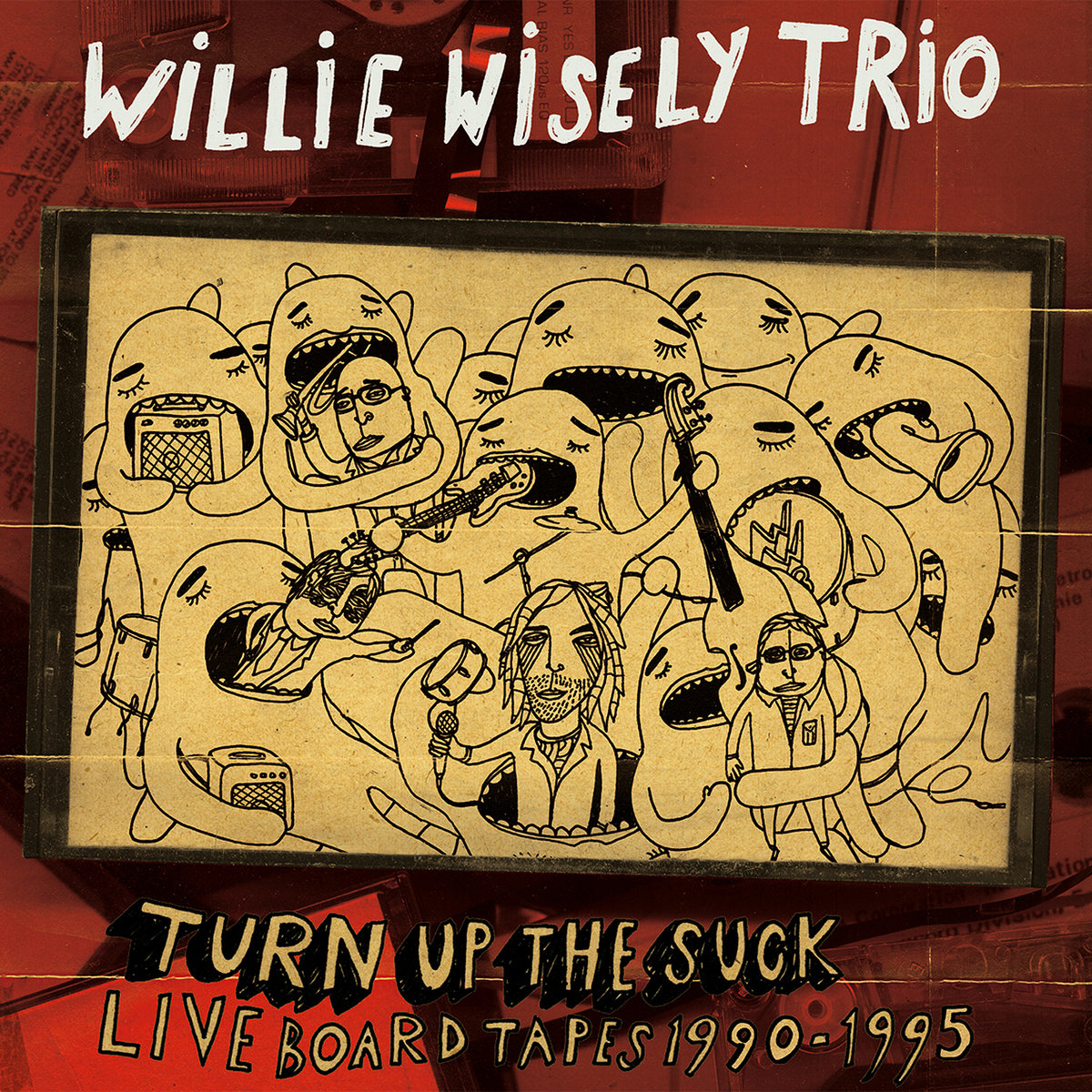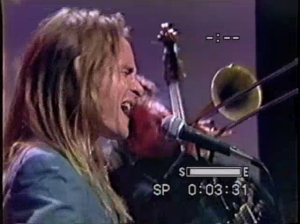Turn Up The Suck – Live Board Tapes 1990-1995
Release Date: 2012
Track List & Lyrics
Click on song title for lyricsPeter Anderson: drums/vocals
James Voss: upright bass/vocals
Willie Wisely: vocals/guitar/harmonica
Greg Wold: trombone/vocals
Written by William John Wisely Jr. (Wisely Publishers ASCAP) except track 1 by Williamson (Arc Music BMI), track 2 by Dixon (Ghana Music/Screen Gems BMI), track 6 & 14 by Dixon (Hoochi Coochie Music BMI), track 8 & 16 by Bundora (Embassy/Marvel Music BMI), track 10 by Dylan (Dwarf Music SESAC), and track 15 by Robinson (Jobete Music ASCAP)
Suck by Willie Wisely
Not mixed by anyone
We are grateful to all the anonymous sound people who originally recorded these performances. We know this: track 4 by Steve Shaw, tracks 5 & 9 by Joel, track 10 by Billy Batson.
Artwork credit Japa
Back photo: Elizabeth Ahrens
© & ℗ 2011.Ella Records. All Rights Reserved.
Touring up to 150 shows a year, the original Willie Wisely Trio developed a musical language unlike anything before or since. These live recordings, culled from a massive archive of cassette board tapes, are proof. Peter Anderson (drums), James Voss (upright bass), Willie Wisely (guitar & vocals), and Greg Wold (trombone).
Lo-Fi Heaven: Boom Box On The Dashboard
As a musician it is easy to know what you’re doing in the moment, but to remember what you were playing 22 years ago is very difficult. Over time, the mind alters sonic memory. What we think we heard ceases to be what actually occurred.
I remembered Trio shows as loud, sprawling affairs. Turns out, they were often quiet and diminutive. I remembered Trio shows as a repeating set list of my more effective songs; but in reality we knew over 100 songs, and played a lot of stuff we didn’t know so well. I also remembered the malignant band disagreements and the foulness of hard work, far from home, for low money. Turns out our shows sounded joyful and idealistic. The most distorted thought I had was that our albums were precise documents of our sound. But those studio chronicles contain a fraction of what we accomplished on a nightly basis. Turns out, only rarely did a studio recording sound like the shows I recently heard while listening to over a hundred cassettes of the band playing live. Hard touring had created a singular sound and I’d forgotten most of what we did together on stage.

Continental Cable, St. Paul, 1992
The inspiration for releasing TURN UP THE SUCK is to fill the memory gaps. It certainly isn’t to show off the high fidelity of these crunchy recordings, or the steadiness of the grooves, nor the perfect pitch of the players. We were a mess, but also a cocktail of joy. None of us would likely again endeavor upon such a formative musical voyage. We were compelled by youthful idealism, stemming from a believe that our vision was unique and that the world ought to hear our music. The business of music is based upon bottling this idealism. But the Trio’s lack of widespread renown is evidence that we were better at letting genies out of bottles than putting them in.
It’s only luck that the archive of cassettes survived. Back in the day, we never listened to them–just threw them into the middle compartment of the van at 2am. After a show, we would usually be too disappointed or drunk to care. Plus, the tape deck situation in the van was dangerous, with a big late-80’s boom box resting unteathered on the dash, soaking up not a little of the driver’s peripheral vision. At night, it was best to keep that monster on the floor where Cheetos and Coke could spill on it.
Turns out the decades were kind to the cardboard boxes that housed the archive––narrowly escaping a basement flood and mold; magically not being erased by long years stored next to the magnets of loud speakers, and hiding deep enough in my mom’s attic to avoid her unsentimental purges. Against all odds, evidence of our wild-eyed years survived.
SUCK is 16 songs (culled from roughly 1,000), each containing a different aspect of our peculiar abandon. We dig the way the lo-fi, unmixed quality makes the band seem even more weird and old than we were. Certainly we never felt understood in the moment of our first run (1989-1993), as evinced by the several tracks on the album which are NOT followed by applause––and on one occasion, only the ridicule of hyena-like laughter (thanks Mike Ruekberg). There’s an old proverb I wrote just now, and it probably went something like this: laugh if you like, but like it when you laugh.
Following are some of the comments made via email by the Trio as we first listened to 60 of the prime performances I found in the archive:
“The sound of cocaine.”
“OK. So we just played the most evil, vibey version of “Good Morning Little School Girl“. At our rubbery best with drums and bass totally solid, but Greg and I painting this pushy-pully masterwork. Most instruments are hard panned. The fidelity is as if the tape is crumpling and warbling off the reel. It’s so wrong that it’s a bit bone chilling. The song ends. Nobody claps. AWESOME!!!!!!”
“I’m telling you guys now. We’re gonna make another record someday, and it’s gonna be on four track cassette.”
“You guys are some of the most attractive musicians I have ever known.”
“Stage banter indicates that some guy who had seen us in the Virgin Islands was in the audience–or perhaps he WAS the audience.”
“Nice! Were we opening for Trip Shakespeare?”
“Man, I don’t even remember that tune… was it originally recorded on wire?”
“There is a potent “jack White/Black Keys before jack white/black keys” record lurking in here with a few tweaks.”
“Mellow Down Easy is my fave I think. It reeks of Muddy Water & Beefheart. I had no idea it was that good. It was the essence/spirit of all of our hero’s.”
“Peter said he felt as if he wasn’t listening to himself play. I know that I’ve forgotten nearly every guitar chord progression and lick on there. Can’t imagine dreaming up this stuff now.”
“I’ve spent so many years trying to do things other than continue my musical illuminations. Minding click tracks, worrying about merch sales, proving I can hit the high notes, making sure the wedding party can hear the lyrics, building an audience, constraining artistic vision to labels, formats, genres, peer pressure, chasing fads, writing sound a-likes for clients, blah blah blah. After a couple decades of that, it’s easy to forget that illumination and inspiration is everything.”
